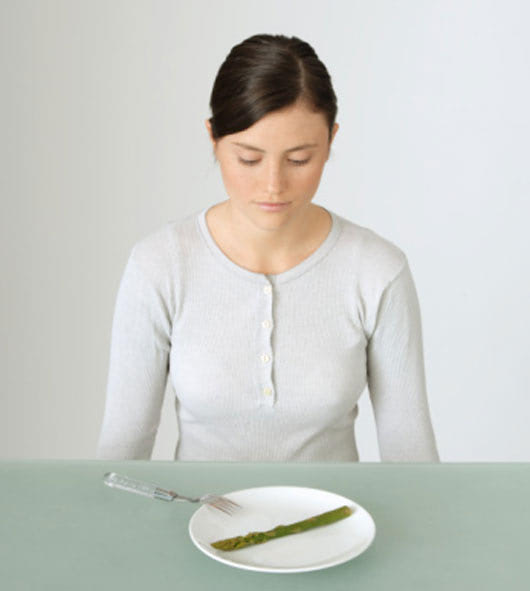Following anorexia nervosa (under eating) and bulimia nervosa (overeating and compensating), orthorexia nervosa (obsessively healthy eating) is the latest eating disorder in the book. It is characterized by a fixation on eating what the sufferer considers to be healthful food, which can ultimately lead to early death.
While anorexia is typically associated with our visual culture and its unreachable beauty ideals, orthorexia seems closely related with our information age and the easy access to facts and figures.
Today so many data about health benefits of our food are available – how it was processed, prepared, etc– and food packages are routinely decorated with scientifically detailed data on their contents. We are suffering from ‘overknowledge’.
While most of us respond to the food-data-overload with an occasional dosage of self chosen ignorance – forget about the facts, grab a burger! – people suffering from orthorexia will spend just as much time and energy thinking about food as someone with bulimia or anorexia.
Taken from the Greek "ortho" (meaning "correct" or "true"), this term was first coined by a Californian doctor, Steven Bratman, in 1997, to describe a "fixation on righteous eating".
Orthorexia, often begins with someone's simple and genuine desire to live a healthy lifestyle. The person may choose to stop eating red meat, but eventually cuts out all meat; then all processed foods, and will eventually eat only specific foods that are prepared in very specific ways.

People suffering from this obsession may display the following signs.
- Spending more than three hours a day thinking about healthy food
- Planning tomorrow's menu today
- Feeling virtuous about what they eat, but not enjoying it much
- Continually limiting the number of foods they eat.
- Experiencing a reduced quality of life or social isolation (because their diet makes it difficult for them to eat anywhere but at home)
- Feeling critical of others who do not eat as well they do
- Skipping foods they once enjoyed in order to eat the "right" foods
- Feeling guilt or self-loathing when they stray from their diet
- Feeling in "total" control when they eat the correct diet
While orthorexia nervosa is not a formal medical condition, many doctors do feel that it explains an important and growing health phenomenon.
If you think you or a friend suffers from something that sounds or feels like this description of orthorexia nervosa, always visit a doctor who can help you.
Sources: Guardian, Wikipedia, Pamf, Orthorexia.com.

Floor van der Geest
Is orthorexia really a disorder? And is it really caused by an information overkill? Maybe the excessive information is only the last step in the chain of causes. Then what is the first step? The standard in our society is to eat lots of prefab (fast)food, chemical additives, genetically modified fruits and veggies, antibiotic-stuffed meat, etc. And now the people who don't want to stay ignorant about this because their bodies and minds are telling them that this foodsystem is harmful for the health of men, animals and the world and nature in general, are the ones having a "disorder". Strange world we're living in.
Posted on
Gigantic Productions
Gigantic Productions is casting for a nationally televised documentary on young people who are obsessed with eating healthy or “pure.” Are you constantly worried about what you can eat and what is in your food? Do you think most foods are dangerous to your health? Are you afraid to eat food that isn’t raw, organic, unprocessed or local? Or maybe you read food labels obsessively and avoid foods with fats, preservatives, additives and animal products. Has this compulsion led you to shed weight, feel weak and suffer panic attacks or severe anxiety? Do you refuse to eat at restaurants or friends’ houses? Are you isolating yourself from friends and family to hide your obsession? If you’ve taken a healthy diet too far, you may be eligible to appear in a nationally-television documentary on a major channel. If this sounds like you and you appear to be between the ages of 16 and 24, email us at casting@gigantic.tv and tell us your story. Please include your name, location, phone number, email and a recent photo of yourself.
Posted on
renra_cikatos
nice info..goodluck for your web....
Posted on
Bahdl
I've got all those symptoms:(
Posted on
Martijn van Mensvoort
Yes, anorexia is typically associated with our visual culture... but beyond this assumption there is plenty of evidence which suggestions that hormone- and brain disorders are also involved in the development of eating disordered behaviors. The following report presents two rather surprising examples of how hormones & the brain relate to the etiology of anorexia nervosa: http://handfacts.wordpress.com/2010/07/20/hand-projections-demonstrate-how-anorexia-works/ (Not sure that there are any indications available that hormones & the brain are also involved in ORTHOREXIA NERVOSA ...???)
Posted on
Josh
I don't spend much time thinking about what to eat (certainly not hours anyway) and I've never felt like my social life was reduced (I don't go out much anyway, and there are plenty of healthy places to eat), but otherwise I have all those other symptoms of orthorexia. I did go see a doctor about no longer enjoying junk food as much as I used to, but he said it was normal for tastes to change and was at least happy they changed in a sensible direction. I'm not too worried anymore, because I feel healthier, but is there some reason to be concerned about being an orthorexic?
Posted on
Jason
The article made the claim that orthorexia can "ultimately lead to an early death" but did not substantiate or provide further elucidation of this claim.
Posted on
inlogic
I guess it's in people's nature, as it is easier (in my opinion) to take extremes in all spectrums of life (political, social, sexual).
Posted on